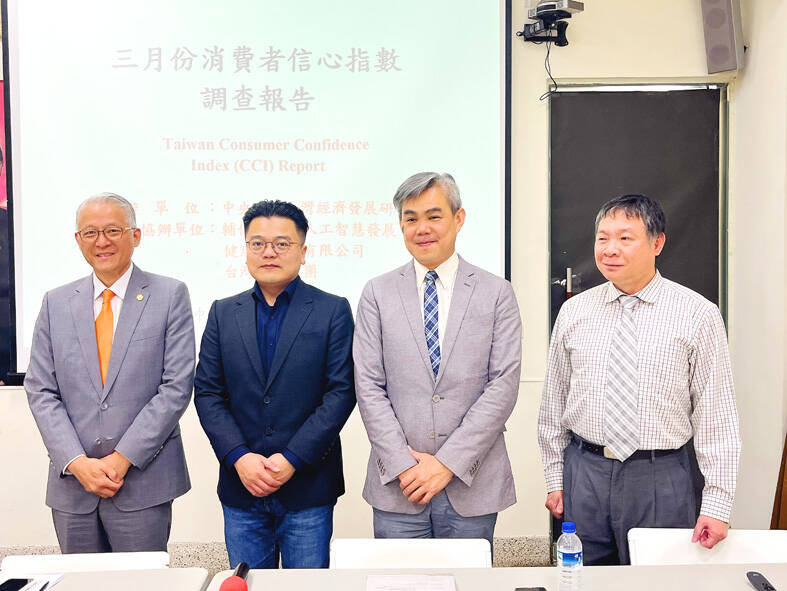Taiwan’s consumer confidence index fell 0.73 points to an 11-month low of 71.86 this month, as the government is set to raise electricity rates next month, fueling inflation concerns, a survey by the Taiwan Economic Development Research Center at National Central University (NCU) showed yesterday.
The subindex on consumer prices lost 1.2 points to 35.26, a new nine-month low, reflecting a general discontent among the public about consumer price trends.
NCU economics professor Dachrahn Wu (吳大任) said that retailers and restaurants would pass cost hikes on to consumers even though heavy electricity users would bear the brunt of fee adjustments.

Photo: Hsu Tzu-ling, Taipei Times
The subindex gauging people’s willingness to purchase durable goods fell by 0.8 points to 101.99, while expectations of household income over the next six months dropped 0.69 points to 81.94, the survey showed.
The subindex measuring people’s stock investment interest shrank 0.59 points to 49.89, the worst in 11 months, as the local bourse saw corrections, in line with global shares, it showed.
The home-buying interest reading softened by 0.72 points to 99.56, as prospective buyers prefer to wait and see on expectations of price falls, the survey showed.
Separately, the National Development Council (NDC) yesterday said its business climate monitor last month turned “yellow-red” for the second consecutive month, reflecting a sustained economic expansion, as local tech firms benefited from US technology giants’ investments in artificial intelligence (AI).
The monitor’s value gained 2 points to 37, just one point away from a “boom,” thanks to a pickup in manufacturing sales, and wholesale, retail and restaurant revenues, the NDC said.
The council uses a five-color system to depict the nation’s economic state, with “red” indicating a boom, “green” suggesting steady growth, “blue” signaling a recession, “yellow-red” showing that the economy is growing stronger and “yellow-blue” suggesting a weakening economy.
“Strong AI demand accounted for improving manufacturing sales and wholesale revenues, offsetting the decline in private consumption,” NDC Economic Department Director Chiu Chiu-ying (邱秋瑩) said.
However, the gauge on overtime hours shed 1 point, as domestic service providers reported a business slowdown after the end of the Lunar New Year holiday, Chiu said.
The index of leading indicators, which seeks to project the economic picture in the following six months, increased 0.64 percent to 103.35, rising for four consecutive months, as construction, semiconductor equipment imports and manufacturers’ business confidence showed positive cyclical movements, Chiu added.
The index of coincident indicators, which mirrors Taiwan’s economic conditions, increased 0.68 percent, the 22nd consecutive month of growth, to 105.27, affirming a steady growth in the economy, Chiu said.
The government has created a task force to monitor and respond to uncertainty linked to US President Donald Trump’s tariff policy, which could have a negative impact on global trade and on Taiwan’s exports, she said.

Intel Corp chief executive officer Lip-Bu Tan (陳立武) is expected to meet with Taiwanese suppliers next month in conjunction with the opening of the Computex Taipei trade show, supply chain sources said on Monday. The visit, the first for Tan to Taiwan since assuming his new post last month, would be aimed at enhancing Intel’s ties with suppliers in Taiwan as he attempts to help turn around the struggling US chipmaker, the sources said. Tan is to hold a banquet to celebrate Intel’s 40-year presence in Taiwan before Computex opens on May 20 and invite dozens of Taiwanese suppliers to exchange views

Application-specific integrated circuit designer Faraday Technology Corp (智原) yesterday said that although revenue this quarter would decline 30 percent from last quarter, it retained its full-year forecast of revenue growth of 100 percent. The company attributed the quarterly drop to a slowdown in customers’ production of chips using Faraday’s advanced packaging technology. The company is still confident about its revenue growth this year, given its strong “design-win” — or the projects it won to help customers design their chips, Faraday president Steve Wang (王國雍) told an online earnings conference. “The design-win this year is better than we expected. We believe we will win

Chizuko Kimura has become the first female sushi chef in the world to win a Michelin star, fulfilling a promise she made to her dying husband to continue his legacy. The 54-year-old Japanese chef regained the Michelin star her late husband, Shunei Kimura, won three years ago for their Sushi Shunei restaurant in Paris. For Shunei Kimura, the star was a dream come true. However, the joy was short-lived. He died from cancer just three months later in June 2022. He was 65. The following year, the restaurant in the heart of Montmartre lost its star rating. Chizuko Kimura insisted that the new star is still down

While China’s leaders use their economic and political might to fight US President Donald Trump’s trade war “to the end,” its army of social media soldiers are embarking on a more humorous campaign online. Trump’s tariff blitz has seen Washington and Beijing impose eye-watering duties on imports from the other, fanning a standoff between the economic superpowers that has sparked global recession fears and sent markets into a tailspin. Trump says his policy is a response to years of being “ripped off” by other countries and aims to bring manufacturing to the US, forcing companies to employ US workers. However, China’s online warriors